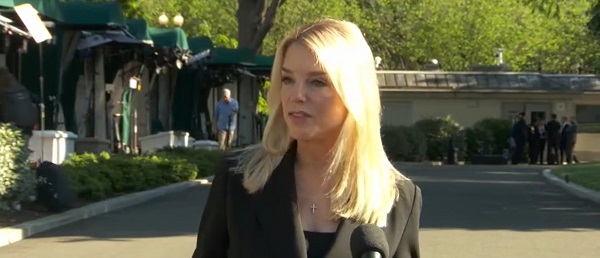Alberta
Premier Smith urges PM Trudeau not to raise carbon tax on April 1

Premier Danielle Smith met with Prime Minister Justin Trudeau in Calgary to discuss areas of priority for the province.
The meeting was constructive, but there are still several issues on which there is some distance between both the federal and provincial governments. These include the impact of the federal carbon tax, and its cascading effects on inflation, affordability and sustained higher interest rates, as well as the timeline to reach carbon neutrality.
Premier Smith reiterated the growing opposition to the federal carbon tax, which includes seven Premiers, federal members of Parliament, and everyday Albertans and Canadians. The Premier suggested that the Prime Minister could achieve a win if he listened to the many voices raised against the carbon tax and reversed his decision to increase the tax by 23 per cent on April 1.
Alberta remains focused on achieving carbon neutrality by 2050 and is a willing partner in responsible, manageable efforts to see that goal through. The province and the federal government have worked together to see several projects start and progress from companies including Air Products, Dow Chemical and Heidelberg. The Premier highlighted the importance of projects that will move the province and country forward on carbon neutrality, including the Pathways Alliance project. Premier Smith is awaiting the federal budget to see if Ottawa will give more clarity to support it.
Premier Smith also relayed to the Prime Minister the massive opportunity Alberta has to export ammonia to South Korea and Japan, in co-operation with British Columbia, and expressed hope that the federal government would be a partner in this work.
Premier Smith expressed gratitude for the progress on the TransMountain pipeline and was encouraged by federal conversations aimed at replicating the highly successful Alberta Indigenous Opportunities Corporation (AIOC). Indigenous leaders across the country have praised Alberta for leading the way on economic reconciliation and being an example that should be followed. There are opportunities for greater Indigenous partnership in energy projects, including the TransMountain pipeline, and in other industries. Premier Smith also highlighted Alberta’s plans to collaborate with First Nations on issues such as mental health and addiction, infrastructure and housing.
Alberta will remain a willing partner when given the opportunity to do so. There are many ways that the province can co-operate with Ottawa that do not involve the federal government overstepping its constitutional authority, and Alberta will continue to advocate for solutions that will benefit Albertans and all Canadians.
Alberta
Alberta’s move to ‘activity-based funding’ will improve health care despite naysayer claims

From the Fraser Institute
After the Smith government recently announced its shift to a new approach for funding hospitals, known as “activity-based funding” (ABF), defenders of the status quo in Alberta were quick to argue ABF will not improve health care in the province. Their claims are simply incorrect. In reality, based on the experiences of other better-performing universal health-care systems, ABF will help reduce wait times for Alberta patients and provide better value-for-money for taxpayers.
First, it’s important to understand Alberta is not breaking new ground with this approach. Other developed countries shifted to the ABF model starting in the early 1990s.
Indeed, after years of paying their hospitals a lump-sum annual budget for surgical care (like Alberta currently), other countries with universal health care recognized this form of payment encouraged hospitals to deliver fewer services by turning each patient into a cost to be minimized. The shift to ABF, which compensates hospitals for the actual services they provide, flips the script—hospitals in these countries now see patients as a source of revenue.
In fact, in many universal health-care countries, these reforms began so long ago that some are now on their second or even third generation of ABF, incorporating further innovations to encourage an even greater focus on quality.
For example, in Sweden in the early 1990s, counties that embraced ABF enjoyed a potential cost savings of 13 per cent over non-reforming counties that stuck with budgets. In Stockholm, one study measured an 11 per cent increase in hospital activity overall alongside a 1 per cent decrease in costs following the introduction of ABF. Moreover, according to the study, ABF did not reduce access for older patients or patients with more complex conditions. In England, the shift to ABF in the early to mid-2000s helped increase hospital activity and reduce the cost of care per patient, also without negatively affecting quality of care.
Multi-national studies on the shift to ABF have repeatedly shown increases in the volume of care provided, reduced costs per admission, and (perhaps most importantly for Albertans) shorter wait times. Studies have also shown ABF may lead to improved quality and access to advanced medical technology for patients.
Clearly, the naysayers who claim that ABF is some sort of new or untested reform, or that Albertans are heading down an unknown path with unmanageable and unexpected risks, are at the very least uninformed.
And what of those theoretical drawbacks?
Some critics claim that ABF may encourage faster discharges of patients to reduce costs. But they fail to note this theoretical drawback also exists under the current system where discharging higher-cost patients earlier can reduce the drain on hospital budgets. And crucially, other countries have implemented policies to prevent these types of theoretical drawbacks under ABF, which can inform Alberta’s approach from the start.
Critics also argue that competition between private clinics, or even between clinics and hospitals, is somehow a bad thing. But all of the developed world’s top performing universal health-care systems, with the best outcomes and shortest wait times, include a blend of both public and private care. No one has done it with the naysayers’ fixation on government provision.
And finally, some critics claim that, under ABF, private clinics will simply focus on less-complex procedures for less-complex patients to achieve greater profit, leaving public hospitals to perform more complex and thus costly surgeries. But in fact, private clinics alleviate pressure on the public system, allowing hospitals to dedicate their sophisticated resources to complex cases. To be sure, the government must ensure that complex procedures—no matter where they are performed—must always receive appropriate levels of funding and similarly that less-complex procedures are also appropriately funded. But again, the vast and lengthy experience with ABF in other universal health-care countries can help inform Alberta’s approach, which could then serve as an example for other provinces.
Alberta’s health-care system simply does not deliver for patients, with its painfully long wait times and poor access to physicians and services—despite its massive price tag. With its planned shift to activity-based funding, the province has embarked on a path to better health care, despite any false claims from the naysayers. Now it’s crucial for the Smith government to learn from the experiences of others and get this critical reform right.
Alberta
Charges laid in record cocaine seizure

From ALERT – The Alberta Law Enforcement Response Team
Five suspects have now been charged in relation to a major cocaine seizure that took place in Edmonton last year. In April 2024 $3 million worth of cocaine and other drugs was seized.
ALERT Edmonton’s organized crime team, in consultation with Alberta Crown Prosecution Service, was able to arrest and lay charges against five suspects on April 21, 2025. The charges are wide-ranging and include participation in the activities of a criminal organization, conspiracy to traffic drugs, drug trafficking, and money laundering.
“Following last year’s drug seizure, our investigative team was able to conduct a thorough investigation and identify the suspects responsible. We now have significant charges put before the courts in the hopes of holding this organized crime group accountable,” said Insp. Angela Kemp, ALERT Edmonton.
The drug seizure was initially announced by ALERT on May 6, 2024. At 27 kilograms of cocaine, it was highlighted as the largest cocaine seizure by ALERT in Edmonton.
The seizure took place on April 30, 2024 when a search warrant was executed at a west Edmonton home in the Lewis Estates neighbourhood.
ALERT alleges that the suspects are part of an organized crime group that was involved in drug trafficking in the Edmonton region, and had also supplied drugs to Grande Prairie and Saskatchewan. ALERT received assistance on the investigation by the Edmonton Police Service and RCMP Federal Policing Northwest Region.
The following suspects were charged:
- Jeffrey Vil, a 45-year-old from Edmonton, is charged with participation in activities of a criminal organization, commission of an offence for a criminal organization, conspiracy to traffic drugs, conspiracy to possess drugs for the purpose of trafficking, possession of drugs for the purpose of trafficking, laundering proceeds of crime, possession of proceeds of crime, and possession of a prohibited device.
- Tommy Szeto, a 35-year-old from Edmonton, is charged with participation in activities of a criminal organization, commission of an offence for a criminal organization, conspiracy to traffic drugs, conspiracy to possess drugs for the purpose of trafficking, possession of drugs for the purpose of trafficking, and laundering proceeds of crime.
- Tayler Fraser, a 27-year-old from Edmonton, is charged with is charged with participation in activities of a criminal organization, commission of an offence for a criminal organization, conspiracy to traffic drugs, and conspiracy to possess drugs for the purpose of trafficking.
- Christian Barwise, a 35-year-old from Edmonton, is charged with drug trafficking.
- Adrian De Guzman, a 27-year-old from Edmonton, is charged with drug trafficking.
The suspects were released from custody and are scheduled to appear in court on May 22, 2025.
Members of the public who suspect drug or gang activity in their community can call local police, or contact Crime Stoppers at 1-800-222-TIPS (8477). Crime Stoppers is always anonymous.
ALERT was established and is funded by the Alberta Government and is a compilation of the province’s most sophisticated law enforcement resources committed to tackling serious and organized crime.
-

 Energy2 days ago
Energy2 days agoOil tankers in Vancouver are loading plenty, but they can load even more
-

 Alberta2 days ago
Alberta2 days agoEnergy projects occupy less than three per cent of Alberta’s oil sands region, report says
-

 Alberta2 days ago
Alberta2 days agoCharges laid in record cocaine seizure
-

 Energy2 days ago
Energy2 days agoCarney’s energy superpower rhetoric falls flat without policy certainty
-

 conflict2 days ago
conflict2 days agoWATCH: U.S. ending bombing campaign on Yemeni militant group
-

 Crime2 days ago
Crime2 days agoPam Bondi Reveals What The Holdup Is With Epstein File Release
-

 Business1 day ago
Business1 day agoInnovative Solutions Like This Plan To Provide Power For Data Centres Will Drive Natural Gas Demand For Decades
-

 Business14 hours ago
Business14 hours agoTrump announces UK will fast-track American products under new deal





